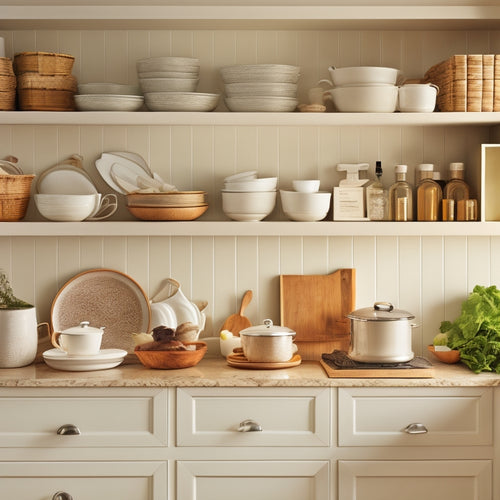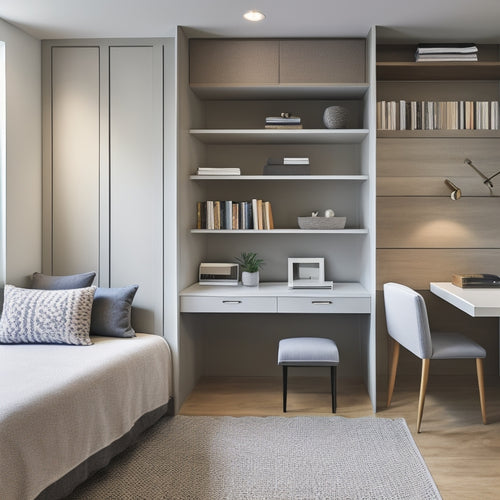
Craft Your Own Stylish Organizer With Ease
Share
You're about to craft a stylish organizer with ease! Start by gathering essential materials like fabric, fusible adhesive, and stabilizer. Next, prepare and cut your fabric accurately, considering grain lines and seam allowances. Then, assemble pockets and binding strips, creating functional pocket organization and decorative binding. Construct the organizer structure by securing side pieces and sewing them to the back piece. Finally, add finishing touches like attaching binding, adding pockets, and embellishing with creative details. As you follow these steps, you'll be surprised at how effortlessly your stylish organizer takes shape, and the best part is yet to come.
Key Takeaways
• Prepare fabric accurately by considering grain line, ironing out wrinkles, and using a rotary cutter and mat for precise cuts.
• Assemble pockets and binding strips with functional pocket organization, bias strips, and fold-over elastic closures for a polished finish.
• Construct the organizer structure by securing side pieces with fusible adhesive, sewing with expert techniques, and customizing fabric with contrasting thread.
• Add finishing touches by attaching binding, adding pockets and details, and incorporating functional features like keyrings or pen loops.
• Get creative with embellishment ideas and consider customization options like card slots or phone holders to make the organizer truly stylish.
Gather Essential Materials and Tools
You'll need to gather a few essential materials and tools to craft your stylish organizer, including fabric, fusible adhesive, mesh fabric, elastic, eyelet, and stabilizer.
When it comes to fabric, explore options that match your personal style, from bold prints to sleek solids. Consider the weight and texture of the fabric, too - you want something sturdy enough to hold your essentials.
For tools, compare brands to find the best fit for you. A good sewing machine needle is a must, and a fabric marking pen will come in handy. Don't forget a ruler and rotary cutter for precise cuts.
With these basics covered, you'll be ready to get started on crafting your dream organizer.
Prepare and Cut Fabric Accurately
To guarantee accurate cutting, begin by preparing your fabric pieces according to the pattern's specifications, considering the fabric's grain line and any necessary allowances for seams or hems. You want to make sure that your fabric selection is spot on, as it affects the overall accuracy of your cuts.
Next, use the right cutting techniques to achieve precision. Here are some tips to keep in mind:
-
Iron your fabric to remove wrinkles and creases
-
Use a rotary cutter and mat for accurate cuts
-
Cut on a stable surface to prevent fabric movement
-
Use a ruler or measuring tape to double-check your measurements
-
Cut slowly and deliberately to avoid mistakes
Assemble Pockets and Binding Strips
With your fabric pieces cut accurately, turn your attention to assembling the pockets and binding strips, an important step in crafting your stylish organizer.
You'll create functional pocket organization with a dash of decorative binding. Start by making bias strips for binding, then assemble mesh pockets with fold-over elastic closures. These pockets will provide easy access to your essentials.
Next, attach the mesh pockets to the front of your organizer, followed by sewing the front and sides together. Don't forget to add decorative binding strips for a polished finish.
With these steps, you'll be well on your way to creating a stylish and functional organizer that's perfect for keeping your daily essentials within reach.
Construct the Organizer Structure
Place the back piece of your organizer on a flat surface, right side facing up, and position the side pieces on either side, making sure their top edges align perfectly.
Now it's time to bring your organizer to life!
To construct the structure, follow these essential steps:
-
Use HeatnBond lite fusible adhesive to secure the side pieces to the back, guaranteeing a sturdy bond.
-
Employ expert stitching techniques to sew the sides to the back, taking care to maintain a consistent seam allowance.
-
Customize your fabric with contrasting thread or decorative stitching to add visual interest.
-
Press the seams to create crisp folds, and trim excess fabric for a professional finish.
-
Double-check your work to ensure the structure is even and sturdy, making adjustments as needed.
Add Finishing Touches and Details
You're ready to add the finishing touches to your stylish organizer by attaching the binding, adding any remaining pockets, and incorporating a few clever details that will make it truly functional and visually appealing.
Now's the time to get creative with embellishment ideas, like adding a monogram or a fun fabric trim. Consider customization options, such as inserting a card slot or a phone holder, to make your organizer truly unique.
Don't forget to incorporate functional features, like a keyring or a pen loop, to keep your essentials within easy reach. Finally, pay attention to design elements, like the color scheme and texture, to make sure your organizer reflects your personal style.
With these finishing touches, you'll have a one-of-a-kind organizer that's both beautiful and practical.
Frequently Asked Questions
Can I Use a Different Type of Adhesive Instead of Heatnbond?
You're wondering if you can ditch HeatnBond for another adhesive, right? Well, the short answer is yes, but with caution!
Fabric tapes can work, but they mightn't provide the same stability.
Spray adhesives are another option, but they can be messy and affect fabric texture.
If you do decide to experiment, make sure to test the adhesive on a scrap piece of fabric first to avoid any mishaps.
How Do I Prevent Fabric From Fraying Without Serging?
Imagine your fabric edges as a rebellious teenager - they'll fray and misbehave if you don't set boundaries! For Fray Prevention, you'll want to bind those edges with a technique that's stricter than a librarian.
Try Edge Binding with bias strips or fold-over elastic to keep your fabric in line. And, if you're feeling extra sassy, use a serger or zigzag stitch to really tame that fray.
Now, your fabric will behave, and your organizer will turn out fabulous!
What Is the Best Way to Store Small Items in the Organizer?
You're wondering how to store small items in your organizer without turning it into a chaotic mess!
To keep things tidy, try categorizing your items into groups like 'daily essentials' and 'occasional needs.'
Then, create a storage hierarchy by assigning smaller pockets for tiny items and larger ones for bigger stuff.
This way, you'll be able to find what you need in a snap!
Can I Add More Pockets or Compartments to the Design?
You want to supercharge your organizer with more pockets and compartments? You're in luck! You can easily add extra pocket options, like mesh pockets or fabric pockets, to stash small items.
Compartment ideas abound, from phone sleeves to pen holders. Simply adjust the pattern, cut out the new pieces, and sew them in. With HeatnBond adhesive, you can create sturdy compartments in no time.
Get creative and customize your organizer to fit your unique needs!
Is It Possible to Make the Organizer Smaller or Larger Than Specified?
You're wondering if you can resize the organizer to fit your unique needs? Absolutely! You can make scale adjustments to create a smaller or larger version.
The key is to adjust the fabric cuts and assembly accordingly. Take advantage of the customization options offered in the pattern to create a bespoke organizer that suits your style.
Just remember to calculate the changes carefully to guarantee a cohesive and functional design.
Related Posts
-

Why Kitchen Cabinet Organization Matters Most
You're likely losing more than just time and ingredients when you can't find what you need in your kitchen cabinets -...
-

10 Best Space-Saving Hacks for Tiny Guest Rooms
You're about to transform your tiny guest room into a cozy retreat that's both functional and aesthetically pleasing....

